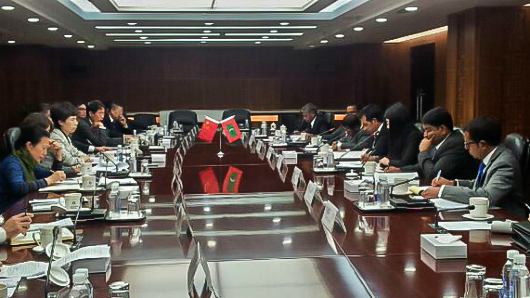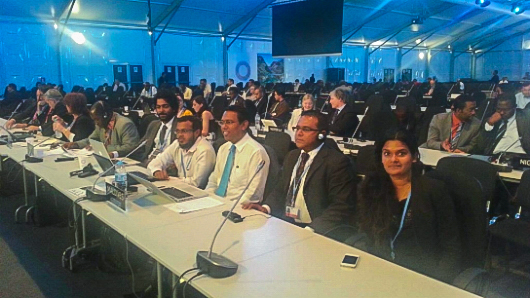The Maldives should forget about stopping the effects of climate change and focus instead on adaptation, says environmental NGO Bluepeace.
“Mitigation is something we have to forget about at the national level,” said Bluepeace Executive Director Ali Rilwan.
Rilwan’s comments come after the conclusion of UN climate change talks in Peru, which have resulted in an agreement slammed as “very weak” by environmental groups.
“We don’t have much faith,” said Rilwan, citing the international community’s failure to follow through on previous commitments. “Locally, we have to look at adaptation. Maldives is the most low-lying country – we have to have dry land.”
As talks concluded in Lima, a delegation of cabinet ministers headed to Beijing for economic talks that will include plans for oil exploration in Maldivian territorial waters – a policy Rilwan described as “ironic”.

“On paper, there are a lot of adaptation programmes, but in reality you don’t see it happening,” he said, perceiving a lack of concern about climate change within the Maldives.
Former President Mohamed Nasheed, who has gained international acclaim as an environmental activist, has recently expressed his concern that the chance to mitigate the effects of climate change has been missed.
“The world has lost the window of opportunity to mend its ways,” he told the International Bar Association in October, suggesting Maldivians were likely to become the world’s first climate change refugees.
“Big emitters have sentenced us. The world temperature will rise, and the seas will rise over our nose.”
“And what restitution, if any, can be made for the damage done to us – damage we warned about, but did not cause? I fear that these questions will be answered one day, not in the abstract, but in a court of law. And I fear that we, the people of the Maldives, will be the star witness.”
Lima Declaration
The Lima Declaration sets out a framework which further differentiates developing and rich states, as well as retaining plans for a “loss and damage” scheme to provide financial support to “vulnerable” developing nations.
However, plans to determine what information countries should provide in future emission reduction pledges were watered down after fierce negotiations.
The word “may” instead of “shall” was eventually used in the final text regarding quantifiable information to show how states intend to reduce emissions targets.
WWF officials have said the declaration text “went from weak to weaker to weakest and it’s very weak indeed”, while Friends of the Earth International said fears the talks would fail to deliver “a fair and ambitious outcome” had been proven “tragically accurate”.
The reduction pledges are required prior to the COP 21 climate change talks in Paris next December, which will seek to decide upon a new framework for a universal and legally binding agreement on climate change.
Maldivian representatives in Lima told the conference this week: “We do not want to be in Paris to get perished”.

Noting the recent pledges to the Green Climate Fund – intended to raise $100 billion a year by 2020 – Ambassador Ahmed Sareer said that “as a small island developing state that is constantly facing an existential threat, the current pledges are simply not enough”.
Officials from the environment ministry were not responding to calls at the time of press.
The Maldives has recently become chair of the Alliance of Small Island States (AOSIS), while former President Maumoon Abdul Gayoom has called on larger nations to allow vulnerable states to take a lead in climate change policy.
Ambassador Sareer said this week that the Maldives’ share of global emission is negligible, and that the government of Maldives was striving to make the country resilient.
The Ministry of Environment and Energy reported that Sareer also attended a number of fringe events in Lima, telling attendees at a Japanese event of the Maldives’ plans to reduce dependency on fossil fuels.
As part of a move to reduce this dependency – which consumes around 30 percent of the country’s GDP – the current government has pledged to work with international groups to explore the potential of oil and gas reserves in the country.
Minister of Fisheries and Agriculture Shainee told media that the government would discuss the issue with two Chinese companies this week as a delegation headed to Beijing for the first China-Maldives Joint Committee on Trade and Economic Cooperation.
India has already offered to assist in oil exploration within Maldivian territorial waters, while a seismic survey was carried out by a German research vessel in August.
Related to this story
Maldivians could be among first climate refugees, warns Nasheed
Silk road deal to be concluded in China-Maldives economic committee
Former President Gayoom calls for leadership of small island states in climate change